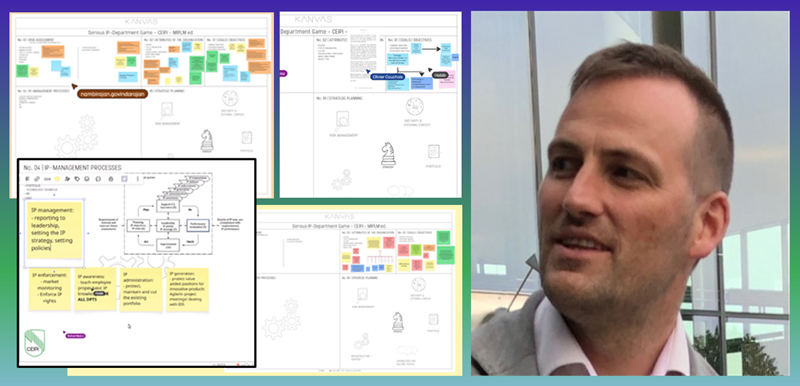Hands-on learning with a Serious IP-Department Game at the CEIPI MIPLM
In an increasingly complex world, traditional learning methods sometimes fall short in preparing individuals for real-world challenges. This is where “serious games” come into play. Unlike games designed purely for entertainment, serious games have a primary purpose beyond mere amusement: to educate, train, or inform. They leverage the engaging nature of games – their rules, objectives, and interactive elements – to achieve specific learning outcomes.
The history of serious games can be traced back to military simulations and educational tools developed decades ago. Over time, their application has expanded significantly, finding their way into healthcare, business, and even policy-making. The benefits of incorporating serious games into training and education are numerous. They provide a safe, low-stakes environment for experimentation and decision-making, allowing participants to learn from mistakes without real-world consequences. This experiential learning fosters deeper understanding and retention compared to passive learning. Furthermore, serious games can enhance problem-solving skills, critical thinking, teamwork, and communication. They make learning more engaging and interactive, often leading to increased motivation and participation.
The Serious IP-Department Game: A Deep Dive into IP Management
The Centre d’Études Internationales de la Propriété Industrielle (CEIPI) Master of Intellectual Property Law and Management (MIPLM) at the University of Strasbourg has embraced the power of serious games with its “Serious IP-Department Game” for the third time. This game, developed and conducted by Magnus Hakvåg, offers a unique and immersive learning experience for future IP professionals.
The Serious IP-Department Game is designed to simulate the complexities and challenges of managing an intellectual property department within a company. Participants are tasked with making strategic decisions related to patent portfolios, trademark protection, licensing agreements, and R&D investments. The game presents players with realistic scenarios, forcing them to consider various factors such as budget constraints, competitive pressures, and evolving market dynamics.
Through interactive and dynamic feedback, the game allows students to experience the practical implications of their theoretical knowledge. For example, they might have to decide whether to file for a patent, pursue a licensing deal, or defend against an infringement claim. Each decision has consequences that ripple through the simulated company’s performance, allowing players to directly observe the impact of their choices. This hands-on approach helps bridge the gap between academic theory and real-world application, preparing students for the multifaceted demands of modern IP management. The game aims to cultivate not just legal expertise but also business acumen, strategic thinking, and collaborative skills, all essential for success in today’s IP landscape.
About the lecturer:
 Magnus Hakvåg is CEO of House of Knowledge, a consultancy that offers strategic advice on how best to protect a company’s innovations and competitive advantages. An expert of over 20 years in innovation, IP/IPR and standards, Magnus served as Convenor of the ISO working group on innovation management terminology (leading to the publication of ISO 56000:2020) and was involved in the revision of the OECD Oslo Manual (4th edition, 2018). He was also part of the European Commission’s “Joint Initiative for Standardisation (Action 3) and is part of DG Grow AASTART (academics active in standardisation-related research and training) which highlights the need for standardization as an element of formal education, academic and vocational training, and has been a consultative body for the Norwegian Ministry of Trade and Commerce on IPR and standards. Magnus earned an MSc in Biophysics and Medical Technology from the Norwegian University of Science and Technology.
Magnus Hakvåg is CEO of House of Knowledge, a consultancy that offers strategic advice on how best to protect a company’s innovations and competitive advantages. An expert of over 20 years in innovation, IP/IPR and standards, Magnus served as Convenor of the ISO working group on innovation management terminology (leading to the publication of ISO 56000:2020) and was involved in the revision of the OECD Oslo Manual (4th edition, 2018). He was also part of the European Commission’s “Joint Initiative for Standardisation (Action 3) and is part of DG Grow AASTART (academics active in standardisation-related research and training) which highlights the need for standardization as an element of formal education, academic and vocational training, and has been a consultative body for the Norwegian Ministry of Trade and Commerce on IPR and standards. Magnus earned an MSc in Biophysics and Medical Technology from the Norwegian University of Science and Technology.



